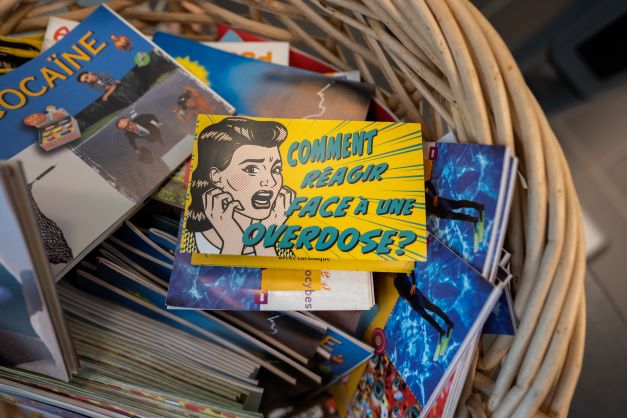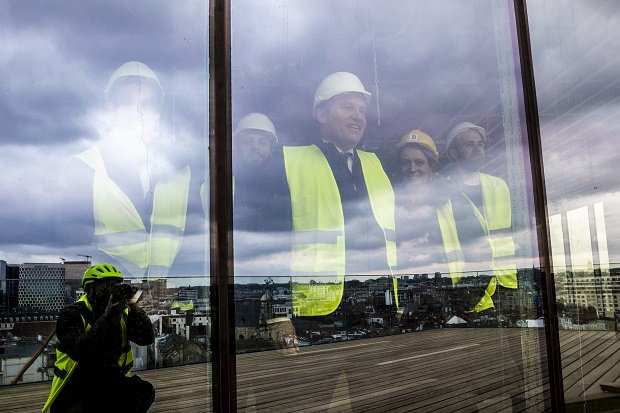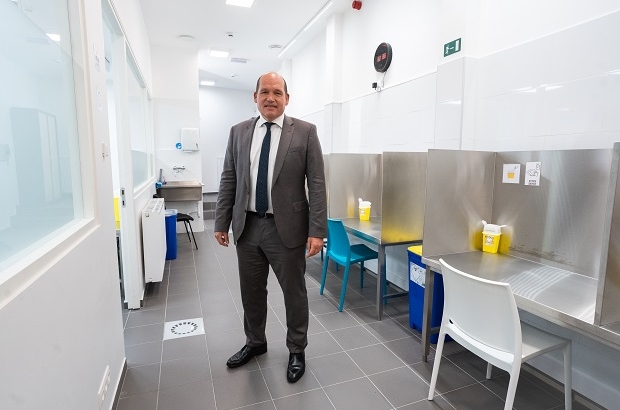- Daily & Weekly newsletters
- Buy & download The Bulletin
- Comment on our articles
War on drugs: Brussels mayor Philippe Close calls for national debate
Philippe Close is a man on a mission. He wants to elevate the focus on fighting drug trafficking to a national debate about addiction as a public health issue. At the heart of his campaign is the message that drug use concerns us all.
From the gleaming new Brucity offices, Brussels’ socialist mayor welcomes the chance to talk about the city’s fight against drugs. As he looks out across other seats of powers on the skyline, from the Royal Palace and Cathedral to the scaffolding-clad palace of justice, his commitment is palpable.
“Drug use affects people from all backgrounds, and those who don’t think this is true are in for a big surprise when they discover that someone in their circle is concerned,” he says. “Among your readers, I imagine there’s not one who isn’t affected by the problem of drug addiction.”
Risk reduction approach
Close wants to involve universities, medical professionals and social workers in developing the best pathway for treating drug addiction. Education is a key factor, he says, providing “adult explanations” and pointing out the “real dangers” to youngsters. “I think many families would be grateful, because they don’t have the answers either when confronted by heroin, cocaine, ketamine, MDMA…” He points to tobacco and alcohol as two health issues that have benefited from extensive public education.
Synthetic substances present new challenges, as people can order items online and fabricate recreational drugs at home. It’s why Close is calling for heroin substitute diamorphine distribution programmes and stepping up schemes like the voluntary testing of illicit substances at festivals carried out by drug user organisation Modus Vivendi.
His call for a multidisciplinary approach, including legalising cannabis for adult users, comes from a determination to lift the shroud over drug use in the country. “It’s a debate that makes people very uncomfortable,” he says. The rise in the use of crack – a highly addictive cocaine derivative – in public spaces such as metro stations has highlighted the extent of the problem.
“My role as a political figure is to detect problems, support health professionals and spark debate,” he says. He rejects the accusation that these policies encourage drug use, adding: “None of the public health actors want this.”

Open discussion
The risk reduction principle is what underpins Gate, the drug consumption space recently opened in Brussels. Close was one of the initiators of the facility, which treats hardened drug users and provides a gateway to rehabilitation.
Nine months after its opening, Close highlights two results. The first, as intended, is reduced consumption in public spaces. The second, and less expected, is that users report they consume less at the centre. It serves as a distraction from their daily lives, as well as providing a care package.
“When they’re on the street, they only have drugs to think about,” he says. While not expecting miraculous results – Gate, run by addiction service Transit, and a similar centre in Liège, treat only the most desperate cases – he’s convinced of their role within a global drug policy. “Society is judged by the way it treats its least well-off citizens; it’s not only for those who are doing well.”
Meanwhile, the fight against drug trafficking is intensifying. The port of Antwerp, one of the largest cocaine hubs in the world, recently launched a new plan to combat trafficking.
“If Antwerp is at the heart of drug-related violence in the country, it’s the payoff for its power, and Brussels is already experiencing the fallout,” Close admits. “It’s by having an open, public health approach that we’ll get results, rather than only fighting trafficking.”
While diverging from Antwerp mayor Bart De Wever’s more repressive policies, Close admires his counterpart’s courage in speaking out about the problem, admitting that drugs were in his police force, port authorities and his own N-VA party.

Shift in mentality
Close clearly stated his party’s intention to open the Gate facility ahead of local elections, taking advantage of a “window of opportunity” in the political agenda. Its almost unanimous political backing by city and regional governments indicates the change in mentality towards fighting drug abuse. He believes Brussels has an important role to play as a testing ground for drug programmes, such as the distribution of diamorphine.
Though he doesn’t compare tobacco to hard drugs, Close is open about his own addiction battle. Once a heavy smoker, he quit some 10 years ago. “I remember the psychological dependence. If I didn’t have two packets of cigarettes on me, I wasn’t well.” His motivation to tackle drug abuse, though, stems from his mother’s work in a centre for co-dependent drug addicts. “I saw the damage that it caused,” he says.
Conscious, too, of the link between addiction and mental health and the prevalence of drug abuse among the chronically mentally ill, he recalls the recent knife attack at Schuman metro station. The father of the perpetrator explained that his son, who suffers from schizophrenia, was delusional. “Covid has done terrible damage; a lot of people stopped taking medication.”
The incident raised the issue of how police respond to psychiatric cases. As the head of the city’s police, he conveys the service’s frustration. They’re trained for a lot of frontline interventions, but they’re not psychologists, he says. “We need to stop thinking that police have the response to everything. They are themselves asking for solutions.”
As he prepares for his next appointment, Close reiterates his message that now is the time to advance the drug debate in Belgium. While he juggles numerous dossiers and urgent matters in the run-up to elections in 2024, there’s no doubting his commitment to raising the profile of the war on drugs.
Photos: Philippe Close at the opening of the Gate-Transit open drug space in Brussels in 2022; Gate-Transit drug centre; Philippe Close at a press conference at Brucity in 2022 © Belga



















